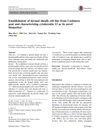 57 citations
,
February 2013 in “Journal of Dermatological Science”
57 citations
,
February 2013 in “Journal of Dermatological Science” Improving the environment and cell interactions is key for creating human hair in the lab.
 45 citations
,
September 2012 in “Life Sciences”
45 citations
,
September 2012 in “Life Sciences” Aconiti Ciliare Tuber extract may help hair grow by activating a specific cell signaling pathway.
 85 citations
,
April 2012 in “PLOS ONE”
85 citations
,
April 2012 in “PLOS ONE” Valproic Acid helps regrow hair in mice and activates a hair growth marker in human cells.
 95 citations
,
January 2012 in “British Journal of Dermatology”
95 citations
,
January 2012 in “British Journal of Dermatology” Androgens block hair growth by disrupting cell signals; targeting GSK-3 may help treat hair loss.
 68 citations
,
December 2011 in “Journal of Investigative Dermatology”
68 citations
,
December 2011 in “Journal of Investigative Dermatology” Sox2-positive dermal papilla cells have unique characteristics and contribute more to skin and hair follicle formation than Sox2-negative cells.
39 citations
,
December 2011 in “PLoS ONE” Radiofrequency exposure can stimulate hair growth by increasing IGF-1 in hair follicle cells.
 314 citations
,
April 2010 in “Developmental Cell”
314 citations
,
April 2010 in “Developmental Cell” β-catenin in the dermal papilla is crucial for normal hair growth and repair.
 321 citations
,
December 2009 in “Journal of Dermatological Science”
321 citations
,
December 2009 in “Journal of Dermatological Science” Dermal cells are key in controlling hair growth and could potentially be used in hair loss treatments, but more research is needed to improve hair regeneration methods.
16 citations
,
May 2009 in “Journal of child neurology” Valproic acid does not change biotinidase enzyme activity in children's blood.
 70 citations
,
January 2009 in “The Journal of clinical endocrinology and metabolism/Journal of clinical endocrinology & metabolism”
70 citations
,
January 2009 in “The Journal of clinical endocrinology and metabolism/Journal of clinical endocrinology & metabolism” Androgens slow hair growth by altering Wnt signaling in balding cells.
36 citations
,
October 2008 in “European journal of paediatric neurology” Valproic acid treatment may cause temporary hair loss due to reduced zinc and biotinidase levels, which tend to normalize after 6 months.
22 citations
,
September 2008 in “Brain & development” Biotin supplements increased biotin levels but did not significantly prevent hair loss in rats on valproic acid.
193 citations
,
May 2008 in “Development” Activating β-catenin can turn skin cells into hair follicles.
 171 citations
,
July 2007 in “Journal of Investigative Dermatology”
171 citations
,
July 2007 in “Journal of Investigative Dermatology” A substance called DKK-1 increases in balding areas and causes hair cells to die when exposed to DHT.
 829 citations
,
May 2007 in “Nature”
829 citations
,
May 2007 in “Nature” Hair follicles can regrow in wounded adult mouse skin using a process like embryo development.
 41 citations
,
January 2007 in “Journal of Korean Medical Science”
41 citations
,
January 2007 in “Journal of Korean Medical Science” Minoxidil and ATRA together boost hair growth more effectively than minoxidil alone.
 417 citations
,
September 2005 in “PLoS biology”
417 citations
,
September 2005 in “PLoS biology” Understanding gene expression in hair follicles can reveal insights into hair growth and disorders.
 30 citations
,
September 2003 in “Experimental Dermatology”
30 citations
,
September 2003 in “Experimental Dermatology” Minoxidil helps prevent stress-caused hair loss in mice.
854 citations
,
February 2002 in “The journal of investigative dermatology/Journal of investigative dermatology” Understanding hair follicle development can help treat hair loss, skin regeneration, and certain skin cancers.
73 citations
,
October 2001 in “Epilepsia” Children taking higher doses of valproic acid had lower biotinidase activity, which may lead to biotin deficiency, but biotin supplements could help.
 63 citations
,
March 2000 in “Annals of clinical psychiatry”
63 citations
,
March 2000 in “Annals of clinical psychiatry” Some psychiatric medications can cause hair loss, but it usually grows back after adjusting the medication.
990 citations
,
October 1999 in “Development” Activated LEF/TCF complexes are crucial for hair development and cycling.
 1113 citations
,
August 1999 in “The New England Journal of Medicine”
1113 citations
,
August 1999 in “The New England Journal of Medicine” Hair follicle biology advancements may lead to better hair growth disorder treatments.
 38 citations
,
September 1996 in “Annals of Clinical Psychiatry”
38 citations
,
September 1996 in “Annals of Clinical Psychiatry” Hair loss from mood stabilizers is common but can be managed without stopping the medication.
9 citations
,
December 1991 in “Annals of the New York Academy of Sciences” 385 citations
,
November 1990 in “Journal of Cell Science” Human hair follicles can grow in a lab setting.


















